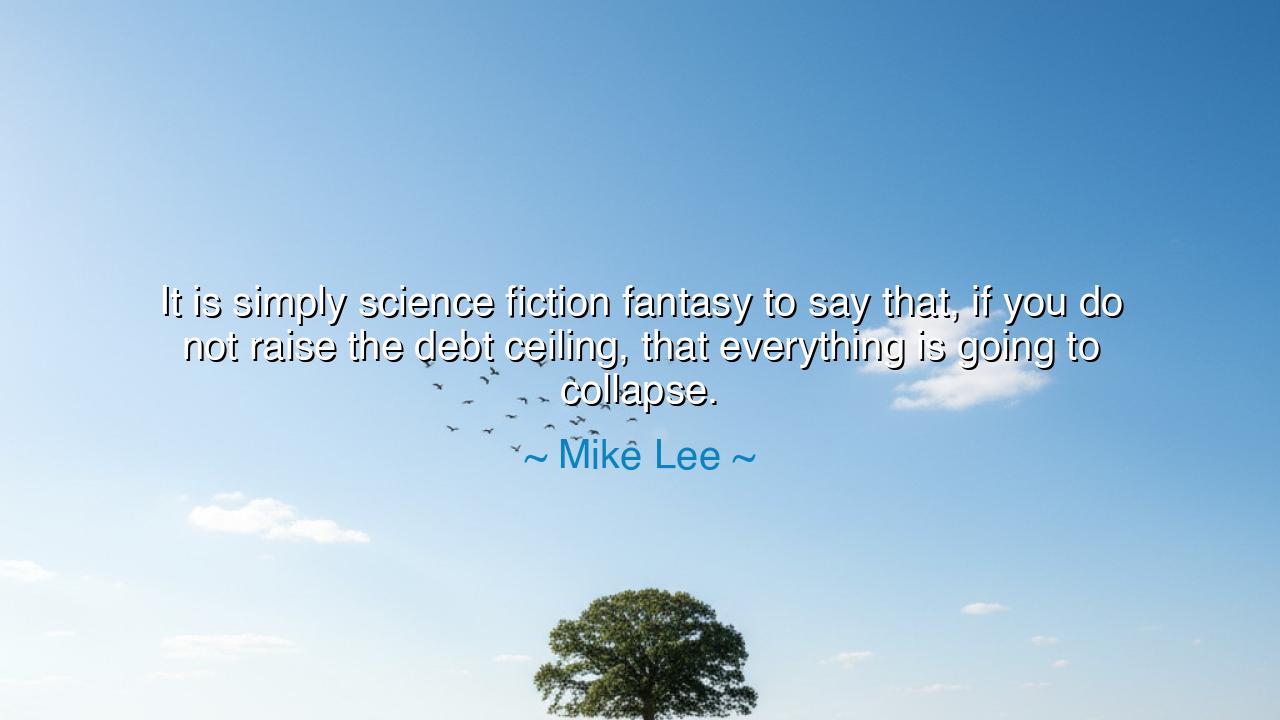
It is simply science fiction fantasy to say that, if you do not
It is simply science fiction fantasy to say that, if you do not raise the debt ceiling, that everything is going to collapse.






"It is simply science fiction fantasy to say that, if you do not raise the debt ceiling, that everything is going to collapse." These words from Mike Lee, a figure well-versed in the art of political rhetoric, challenge a notion that often permeates discussions of national finance: the idea that the debt ceiling is the ultimate lever upon which the fate of a nation hangs. The boldness of his assertion—that such dire predictions are nothing more than fiction—speaks to the heart of a deeper, age-old truth: that fear can be a tool, often wielded by those in power, to manipulate and control. The idea of collapse, as Lee suggests, is a myth constructed to drive the masses into submission, to create a sense of inevitability and helplessness where none exists. The real question is whether we, as a society, will be swayed by fear or rise to confront the facts.
In the ancient world, there were many who sought to shape the destinies of kingdoms through the use of fear. Alexander the Great, when conquering new lands, was known not only for his military prowess but for his ability to inspire awe and fear in the hearts of his enemies. But he also understood that fear could be fleeting, and that true power came not from intimidation, but from strength, vision, and the ability to chart a course toward prosperity. Fear, though useful in the short term, is a fragile foundation upon which to build a lasting empire. To rely on it is to misunderstand the true nature of power and governance.
We see the same phenomenon in modern political struggles. The debt ceiling, an abstract concept in the world of finance, has been portrayed in the media as a cliff over which society will fall if we do not raise it. The collapse is often painted in broad strokes: economic disaster, global instability, and a crisis that threatens the very foundation of national security. But, as Lee points out, this is a fantasy—a narrative designed to elicit a reaction, to push through a policy without the careful examination it deserves. Much like the ancient kings who used fear to control their subjects, today’s leaders may use exaggerated threats to manipulate the public’s emotions and force decisions that serve their interests, not the nation’s long-term health.
Consider the story of Cicero, the great Roman statesman, who, in the midst of political turmoil, often warned against the dangers of fear-mongering. He understood that fear is a powerful tool when used by those who seek to control the masses. Yet, Cicero also recognized that a nation must be guided by reason and wisdom, not by the panic instilled by false threats. His speeches were filled with calls for careful deliberation, for understanding the true cost of political actions, rather than succumbing to the hysteria of the moment. Cicero knew that a government built on fear is a government ripe for manipulation, one that cannot stand in the face of reason and truth.
In our own time, Lee’s words remind us that we must resist the urge to be swept away by alarmist rhetoric. The true test of a nation’s strength lies not in how it reacts to threats, but in how it stands firm in the face of them. Just as the great leaders of history understood that power is rooted in reason, so too must we understand that economic decisions should be made with wisdom, not panic. The debt ceiling is not the end of the world; it is a moment for reflection, for negotiation, and for the careful consideration of long-term policies that will ensure a nation’s financial health. To succumb to fear is to ignore the deeper realities that govern our future.
Lee’s statement also carries an important lesson about the nature of leadership. True leaders do not govern through fear of collapse or disaster; they govern by presenting a clear, reasoned path forward, even in times of uncertainty. Just as Plato’s philosopher-kings were not swayed by the whims of the crowd, but by the pursuit of the greater good, modern leaders must rise above the specter of panic and engage in thoughtful, deliberate actions. The greatest moments in history have come not from reacting to fear, but from the steady hand of leadership that guides a nation toward stability and progress.
Therefore, let us take Mike Lee’s words as a reminder that reason, not fear, must guide our decisions. We must not be deceived by fantasies or false narratives that seek to manipulate us into acting out of panic. Courage is found in calm deliberation, in choosing to look beyond the immediate threats and to focus on the long-term solutions that will secure a nation’s future. Whether in matters of finance, politics, or life itself, let us resist the allure of fear, for it is through wisdom and reason that we will find the true strength to navigate the challenges before us. The greatest societies of history did not collapse under pressure; they endured because their leaders understood that true power lies in understanding and action, not in the illusion of imminent disaster.






AAdministratorAdministrator
Welcome, honored guests. Please leave a comment, we will respond soon